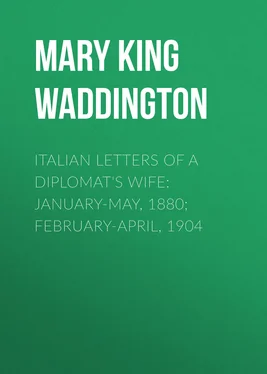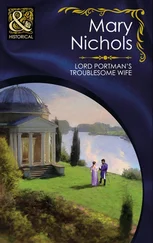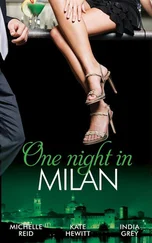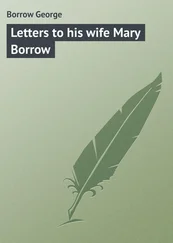Mary Waddington - Italian Letters of a Diplomat's Wife - January-May, 1880; February-April, 1904
Здесь есть возможность читать онлайн «Mary Waddington - Italian Letters of a Diplomat's Wife - January-May, 1880; February-April, 1904» — ознакомительный отрывок электронной книги совершенно бесплатно, а после прочтения отрывка купить полную версию. В некоторых случаях можно слушать аудио, скачать через торрент в формате fb2 и присутствует краткое содержание. Издательство: Иностранный паблик, Жанр: Биографии и Мемуары, История, foreign_edu, foreign_antique, foreign_prose, на английском языке. Описание произведения, (предисловие) а так же отзывы посетителей доступны на портале библиотеки ЛибКат.
- Название:Italian Letters of a Diplomat's Wife: January-May, 1880; February-April, 1904
- Автор:
- Издательство:Иностранный паблик
- Жанр:
- Год:неизвестен
- ISBN:нет данных
- Рейтинг книги:3 / 5. Голосов: 1
-
Избранное:Добавить в избранное
- Отзывы:
-
Ваша оценка:
- 60
- 1
- 2
- 3
- 4
- 5
Italian Letters of a Diplomat's Wife: January-May, 1880; February-April, 1904: краткое содержание, описание и аннотация
Предлагаем к чтению аннотацию, описание, краткое содержание или предисловие (зависит от того, что написал сам автор книги «Italian Letters of a Diplomat's Wife: January-May, 1880; February-April, 1904»). Если вы не нашли необходимую информацию о книге — напишите в комментариях, мы постараемся отыскать её.
Italian Letters of a Diplomat's Wife: January-May, 1880; February-April, 1904 — читать онлайн ознакомительный отрывок
Ниже представлен текст книги, разбитый по страницам. Система сохранения места последней прочитанной страницы, позволяет с удобством читать онлайн бесплатно книгу «Italian Letters of a Diplomat's Wife: January-May, 1880; February-April, 1904», без необходимости каждый раз заново искать на чём Вы остановились. Поставьте закладку, и сможете в любой момент перейти на страницу, на которой закончили чтение.
Интервал:
Закладка:
We are starting to-night, straight for Florence, where we shall stay a week or ten days with the Bunsens before going on to Rome. W. is much pleased at the Roman prospect—and I can hardly believe that I am going to see Rome again. We have our lit-salon straight through to Florence, and I hope we shall be warm enough. It is bitterly cold to-day—even walking I was glad to have my sealskin coat. Nounou is rather tearful at being left in sole charge of Francis, but as that young gentleman is perfectly well, in roaring spirits, and will be given everything his heart desires by his Grandmother and Aunts, I don't feel very unhappy about him. It seems incredible that we should be going to meet soon. How we will prowl about Rome. I suppose I shall find it absolutely changed—so many more people—not our dear old dead Rome.
To H. L. K. 8 8 Mrs. Charles King, mother of Madame Waddington.
We arrived quite comfortably, dear mother, but almost frozen, particularly W. He has not been extracted from the fire since we got here. Henrietta will have told you of our start. Pontécoulant and one or two men were at the station to see us off—also the Chef de Gare, most civil, and saying we should not be disturbed at the frontier—and that our coupé-lit would take us straight through to Florence. We had a perfectly easy journey, and I slept quite peacefully—waking up merely when we passed through the tunnel, as the guard came in to shut all the windows. It was a beautiful, cold, starlight winter night. The great mountains covered with snow looked gigantic as we approached—"sinistres" as Madame Hubert 9 9 Madame Waddington's maid.
said. She was much impressed and rather nervous. There were very few people in the train. When we arrived at Modane the Chef de Gare was waiting for us—he had been telegraphed from Paris to expect us. We had breakfast in the private room, and a nice woman was waiting for us upstairs in the ladies' room with hot water, towels, etc. I made quite a toilet—she carried off my dress and jacket to brush—and then we went down to a nice little breakfast which tasted very good, as I hadn't had anything since our 7 o'clock dinner. They offered us coffee somewhere—Dijon I think—but I didn't want anything then. All the first part of the road—in fact all the road to Turin was lovely. It was a bright, cold morning, and the snow mountains looked beautiful. It was such a pleasure to hear Italian once more—even the names at the stations "capo stazione"—"grande velocità"—"uscita," etc., also the shrill "partenza" when we started. The last time I crossed the Mont Cenis was by the Fell railway when we all started together from Aix. That was certainly very beautiful—but rather terrifying—particularly as we neared the top and looked at the steep places and the various zigzags we were to follow going down. One couldn't help feeling that if a brake or chain broke there would be a terrible catastrophe. I remember so well some of the women who were quite sea-sick—the swaying motion, I suppose, as we rounded the curves, of which there were many. I can see one now stretched out on the floor on a rug in the small salle d'attente at Susa, quite exhausted and absolutely indifferent to the outside world.
We had quite a wait at Turin. Our coupé was detached and put on the Florence express. They locked the doors, and we left all our things—books, shawls, bags, etc.—and had a very fair dinner at the buffet. We had so much time that Madame Hubert and I went for a little walk. There was not much to see close to the gare—but it was delightful to me to hear Italian again, and to see the idle, placid crowd standing about—nobody in a hurry apparently, and nobody jostling and pushing through, though there were trains starting or coming in all the time. W. was too cold to move—he really should have had a fur coat—which he utterly despises—says that will do when he is 70, and can't walk any more. It was warm and fairly light in the buffet so he established himself there with a paper and was quite happy. We got here about 6.30—Charles de Bunsen was at the station with a carriage—so we came off at once, leaving Madame Hubert and Francesco with the trunks. How she will get on in Italian I don't know, but she is very active and débrouillarde, and generally makes herself understood. Mary 10 10 Madame de Bunsen, née Waddington.
was waiting for us with tea and those crisp little grissini 11 11 Long crisp breads one has in Italy.
we always used to have in Casa Guadagni. They have a charming "villino"—part of the McDonnell villa. One goes in by a small door (in one of the narrow grey streets of old Florence, with high walls on each side—Via Romana) and straight up a fine broad staircase to a good palier with large high rooms opening out on it. All the bed-rooms and small salon open on a loggia overlooking the garden—a real old Italian garden. I shall never be dressed in time for anything in the morning, as I am always on the loggia. The flowers are all coming out—the birds singing—the sky bright, deep blue—and the whole atmosphere so soft and clear—and in fact Italian—different from everything else.
Mary has arranged the small salon (which they always sit in) most prettily and comfortably—with bibelots and quantities of books about in all languages—there are usually four going in the establishment—Charles and his daughter speak always German to each other—the rest of us either French or English—it depends rather upon what we are talking about—and always an undercurrent of Italian with the servants and "parlatrice" (such a sweet, refined looking girl who comes every day to read and speak Italian with my belle-mère). Mrs. Waddington strikes at the mixture at meals and insists upon one language, either English or French. There is also a charming German girl here, Mlle. de Sternberg, a niece of Charles de Bunsen—so we are a most cosmopolitan household. The life is utterly different from the one I have been leading for the last two years.
To H. L. K
I try and write every day, but am so much taken up and so tired when I come in that I don't always find the moment. W. is all right again. He really got quite a chill from the cold night journey—and for two or three days sat in the fire. Francesco, the Italian servant, took excellent care of him—was so sympathetic the night we had some music and W. couldn't appear. It was a pleasant evening—a Russian Prince (I forget his name, and couldn't probably spell it if I remembered), a great friend of Mary's, an excellent musician and a great Wagnerian offered to come and play some of the Nibelungen. I was delighted as I only know Tannhäuser and Lohengrin. I remember now your sigh of relief when Seilern and I finished playing à 4 mains the Walpurgis Night years ago in the Champs Elysées. I daresay it was trying for the public—but we enjoyed ourselves immensely. The big drawing-room looked very pretty, with plenty of flowers, and I think there were about 50 people—almost all (except Lottie and Madame de Tchiatcheff) ardent admirers of the great man. One lady appeared in a sort of loose, red gown (it seems red is the only colour Wagner admits), her hair, very pretty, blonde, hanging down her back, just tied with a ribbon—and carrying two partitions. Mary said, "Wouldn't you like to sit by her, and she will explain it all to you?"—but I said there was nothing I would like so little. I knew enough of the legend to be able to follow, and moreover I had always heard that Wagner's descriptive music was so wonderful that one understood everything without any text, etc. The great man appeared—the grand piano was opened all over to give as much sound as possible—and he requested absolute silence. He played beautifully—it was enchanting—one quite heard the little waves in which the Rhein-Töchter were disporting themselves. It was wonderfully melodious and delicate—I should have liked it to go on forever. He played for about three-quarters of an hour—all Rheingold—then suddenly pushed back his chair, and rushed to the anteroom, exclaiming "de l'air—de l'air," followed by all the red and musical ladies. It is a pity there must always be such a pose with Wagner—for really the music was a joy. I met of course quantities of old friends, and agreed to go to Lottie Van Schaick's ball.
Читать дальшеИнтервал:
Закладка:
Похожие книги на «Italian Letters of a Diplomat's Wife: January-May, 1880; February-April, 1904»
Представляем Вашему вниманию похожие книги на «Italian Letters of a Diplomat's Wife: January-May, 1880; February-April, 1904» списком для выбора. Мы отобрали схожую по названию и смыслу литературу в надежде предоставить читателям больше вариантов отыскать новые, интересные, ещё непрочитанные произведения.
Обсуждение, отзывы о книге «Italian Letters of a Diplomat's Wife: January-May, 1880; February-April, 1904» и просто собственные мнения читателей. Оставьте ваши комментарии, напишите, что Вы думаете о произведении, его смысле или главных героях. Укажите что конкретно понравилось, а что нет, и почему Вы так считаете.












